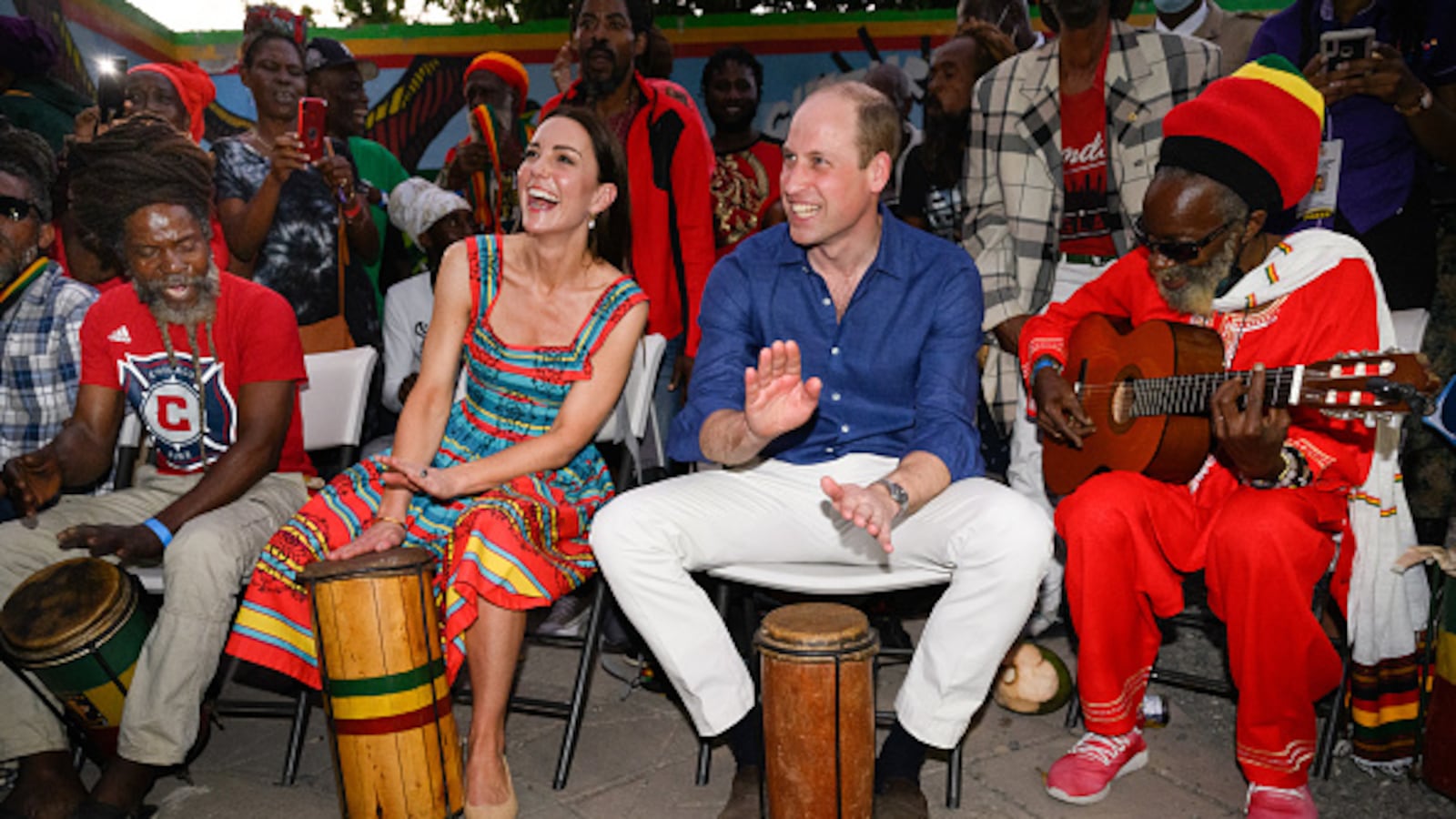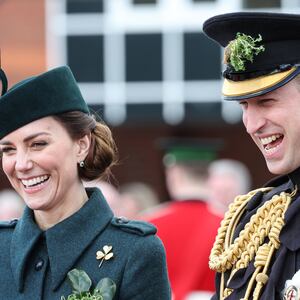Wednesday evening in Jamaica, Prince William is expected to acknowledge, in a speech, the issue of slavery.
What he will say, and whether it will go any way to assuaging the boiling anger felt by many in Jamaica and other former colonies with whom the British royals have a bitter and unresolved history, remains to be seen.
Of course, this is not the conversation that Prince William and Kate Middleton thought they would be having on their increasingly troubled tour of Central America and the Caribbean. Instead, it was intended as a thank you tour to mark the queen’s Platinum Jubilee, featuring staged, cheery photocalls, and Kate in pretty dresses.
After an embarrassing start in Belize, which saw them cancel their first official visit of the trip to a cacao farm in the face of anti-colonialism protests, the couple were landed in Jamaica Tuesday afternoon, where protestors greeted them outside the venue for their first engagement, a dinner at the British High Commission.
The protest was spearheaded by a group of 100 community leaders calling themselves the Advocates Network.
The group issued an open letter to William and Kate on Sunday reading, in part: “We see no reason to celebrate 70 years of the ascension of your grandmother to the British throne because her leadership, and that of her predecessors, have perpetuated the greatest human rights tragedy in the history of humankind.”
One of the protest’s leading lights, the writer Opal Palmer Adisa, told Sky News: “Kate and William are beneficiaries, so they are, in fact, complicit because they are positioned to benefit specifically from our ancestors, and we're not benefiting from our ancestors. The luxury and the lifestyle that they have had and that they continue to have, traipsing all over the world for free with no expense, that is a result of my great, great grandmother and grandfather, their blood and tears and sweat.”
Within hours of landing for their two-day Jamaica tour, William and Kate had already ticked many classic Jamaican boxes, including saying hello tot the Cool Runnings Jamaican bobsleigh team and visiting Bob Marley’s home. Although they received a rapturous welcome from crowds in Trench Town, critics are likely to pounce on this calling point as particularly hypocritical. Indeed, the open letter from the Advocates Network, specifically mentions Marley, saying: “As a Rastafarian, Bob Marley embodied advocacy and is recognized globally for the principles of human rights, equality, reparations and repatriation.”

Prince William, Duke of Cambridge and Catherine, Duchess of Cambridge visit Trench Town Culture Yard Museum where Bob Marley used to live, on day four of the Platinum Jubilee Royal Tour of the Caribbean on March 22, 2022 in Kingston, Jamaica.
Pool/Samir Hussein/WireImageJamaican lawyer and activist Dr Shola Mos-Shogbamimu, author of This Is Why I Resist, tweeted that the royal tour is “an utter failure. Times have changed and the tide has turned. This Platinum Jubilee tour is tone-deaf. British Monarchy faces a reckoning.”
ITV news, meanwhile, reported that a source in the Jamaican government had told them the country would start the process of removing the queen as head of state “as soon as” William and Kate have flown home. A royal aide told the Daily Mail, on the issue of the country becoming a republic: “The duke and duchess say it is a matter for the people and government of Jamaica.” Their office did not respond to a query from The Daily Beast.
Whether the process happens slowly or quickly remains to be seen, but it does seem inevitable that Jamaica and the six other Caribbean states that still count the queen as head of state will ultimately follow the lead of Barbados, which fired her last year and became a republic. Charles attended the handover.
However, royal commentator Duncan Larcombe, former royal editor at the Sun, says it would be a mistake to write the tour off as a failure, especially when the impact back home is taken into account: “Judging by the coverage in the U.K. this tour is going down very well indeed; the narrative is Kate’s pretty clothes and the new royal power couple that are William and Kate. It’s not going down too well in some quarters in the places they are visiting, but that’s only to be expected. Overwhelmingly, people are still turning out in huge numbers to catch a glimpse of them, and that really is the sign of whether a tour is going well or not. If two people turn up, that’s a disaster.”
Emily Andrews, a royal writer and former royal correspondent for the Mail on Sunday who has been on countless royal tours, told The Daily Beast: “I think they expected opposition, and coverage of said opposition. They’ve never been to the Caribbean before so it’s good they’ve gone and there does seem to be a lot of positivity and cheer that they’re there.”

Catherine, Duchess of Cambridge arrives with Prince William, Duke of Cambridge at Norman Manley International Airport to visit Jamaica as part of their Royal Tour of the Caribbean on March 22, 2022 in Kingston, Jamaica.
Karwai Tang/WireImageHowever Andrews added that the “optics” of the couple appearing to be having a fun holiday were sub-optimal, saying, “Pictures of William and Kate enjoying fun stuff are always nice, but there is also a war on.”
The last time a royal visited Jamaica, it was Prince Harry who danced in blue suede shoes in the streets of Kingston and sneaked a dubious victory in a sprint against Usain Bolt. Would a royal tour conducted by Harry and Meghan today gone any differently?
The British Jamaican theologian Robert Beckford, PhD, told The Daily Beast via email: “Meghan, a woman of dual heritage who has lived a more diverse and cosmopolitan existence than most of the prominent Royals, would have more respect and sensitivity towards coloniality (the continuing impact of the colonial legacy). They’ve lost a real asset assuaging the historical-racialized tensions and histories in the (un)Commonwealth. You’ve got to wonder, though, who is advising the royal family on sensitive issues of colonial history? GBTV?”
Beckford added: “I think the failure of the royal household to appreciate the change in political temperature towards the colonial legacy in the Caribbean is, at best clumsy and, worst, hubris.
“It is now time for them to reflect on their role in the trafficking and subjugation of millions of enslaved Africans in the West Indies. An apology, remorse, and reparations are now a minimum requirement for the royals to atone for their historic wrongdoing and unjust enrichment. Maybe a more diverse ‘firm’ would have cultivated greater historical and cultural awareness.”
Tonight, William has the opportunity to start that conversation. Will he take it, and if so, how will he frame and phrase it?






